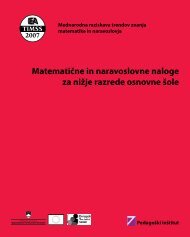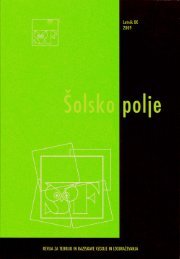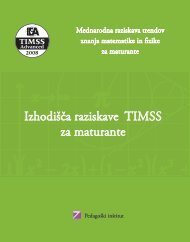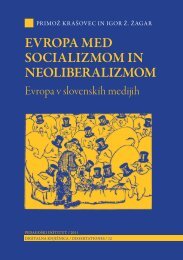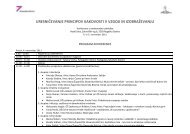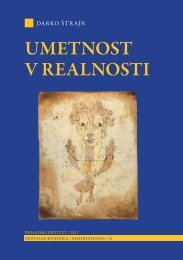106 ŠOLSKO POLJE LETNIK <strong>XX</strong> ŠTEVILKA 5/6new sort of modernity. But insisting on a market economy, without the socialcohesion, which was shown in a World Bank’s study (Yordan, 2003), isnot and cannot be a guarantee of a self-sustaining peace. »As a result, thesuccess of the present peace building operation should not be solely gaugedby how much the economy grows, by how many bills are passed bythe legislature, or by how many pro-GFA supporters are elected to publicoffice (Yordan, 2003: 63). »Indeed, one of the major faults of the peaceprocess is that international diplomats are not accountable to Bosnia’scitizens and their policies often disregard the opinions of the country’spolitical leaders« (Yordan, 2003: 71).This lack of consideration for the BiH political subjects, while runninga policy that eventually has to result in a modern state, and legitimizingethno-nationalist leaders and their separatist politics while at thesame time pursuing the idea of a strong state of BiH are probably twolargest paradoxes of the OHR discourse which have subsequently createdtwo very opposing and confusing messages to BiH citizens. To imposelaws regulating civilian life without civic participation 4 , to create packetsof laws aimed at strengthening ‘jobs and justice’ without input of BiH politicians(Knaus and Martin, 2003: 1), to ignore the country’s historic commonalities,multiculturalism, memory and emancipatory potentials of thesocialist Yugoslav past in a monologic imposition of liberal-democraticBosnianhood from above without any plans of restoring the country’sgenuine and full sovereignty; these are acts of colonization. These actshave been justified by the lack of democracy in BiH and have also beenrecontextualized as necessary steps for democracy and Europeanization,which is a rather circular logic. Even the concept of democracy has beenan ideologically loaded one being upheld as »a universal aspiration...difficultto obtain outside the developed and mature democracies of the West«(Chandler, 2000: 17). They behaved as if BiH was a clean slate on whichliberal Western values were simply to be inscribed.An unprecedented amount of control resting with the HR has produceddiscursive relations of power and inequality between the participants and hasalso, as a result, affected their identities and social roles particularly when it comesto the noted lack of agency for BiH citizens and ‘progress from the above’(Knaus and Martin, 2003: 68). This apparent progress is »no longer measuredby free elections and constitutional frameworks, but on the basis of allegedcultural distinctions or ill-defined assessments of civil society...(which) has ledto an increasingly qualified acceptance of liberal democracy in states outside
THE VOICE OF AN AGENDA-SETTING AUTHORITY - CONTENT CHARACTERISTICS ...107the West...and the international regulatory bodies which are now overseeingthe political process in the new democracies« (Chandler, 2000: 4).The OHR’s mandate was strengthened in 1997 by the Bonn Peace ImplementationCouncil powers 5 , an ad hoc created body aiming to follow theimplementation of GFA. The Bonn Declaration gave the HR the power topropose and adopt legislation when conflict among politicians stalled thelegislative process, and to dismiss politicians who worked to prevent or delaythe implementation of the Dayton Peace Accords. Carlos Westendorp,the second High representative who originally campaigned for the expandedmandate, and his successors Petritsch and Ashdown, have rewritten orimposed over 100 laws, spanning economic, social, political, and judicialissues, and have removed over eighty individuals from public office 6 « (Yordan,2003: 61). Today, that number is over 150 individuals; only in June 2004,the HR Ashdown removed and conditionally removed around 60 individualsfrom their public positions. In May 1999, Westendorp said to Wall StreetJournal: »Yes, this disregards the principles of sovereignty, but so what? Thisis not the moment for post-colonial sensitivity...The problems of the regionwill only be solved when we have introduced a general respect for democracyand the rule of law« (Westendorp, 1999 in Chandler, 2000:201). In August<strong>2009</strong>, in their rehabilitation process, some 53 were repealed by the currentHigh Representative Valentin Inzko, as they were no longer seen to be athreat to peace implementation, institutional integrity or democracy.4. Delineating the OHR discourse: the scope and the truthThe discourse of the international community in BiH is vast and includestexts produced by other international organizations such as OSCE or UNIPTF, Dayton Agreement, press reports and public addresses to name buta few. After Dayton, which not only established international control overmilitary forces on the ground but also put into practice a new, post-ColdWar, international agenda for long-term peace-building. This new role forinternational institutions is increasingly described as democratization...amajor international experiment in political engineering in BiH. (Chandler,2000: 1-2). Although the role of the OHR was initially established to createlong term peace and democracy, the OHR’s discourse was pregnant withdiscursive formations that were to be reenacted well before they were dialogicallyarticulated, surpassing and exceeding the formal boundaries ofthe Dayton. This analysis seeks to outline elements of discursive constructionof democratization and transition in the country by identifying and
- Page 3:
VSEBINA LETNIK XX ŠTEVILKA 5/6 Z
- Page 7 and 8:
UVODNA NOTICAIgor Ž. ŽagarTole pi
- Page 9 and 10:
ZA KAJ GRE V KAD - PREGLEDZGODOVINE
- Page 11 and 12:
ZA KAJ GRE V KAD - PREGLED ZGODOVIN
- Page 13:
ZA KAJ GRE V KAD - PREGLED ZGODOVIN
- Page 17 and 18:
ZA KAJ GRE V KAD - PREGLED ZGODOVIN
- Page 19 and 20:
ZA KAJ GRE V KAD - PREGLED ZGODOVIN
- Page 21 and 22:
ZA KAJ GRE V KAD - PREGLED ZGODOVIN
- Page 23 and 24:
ZA KAJ GRE V KAD - PREGLED ZGODOVIN
- Page 25 and 26:
ZA KAJ GRE V KAD - PREGLED ZGODOVIN
- Page 27 and 28:
DISKURZ: FOUCAULT, LACLAU TERZAPOPA
- Page 29 and 30:
DISKURZ: FOUCAULT, LACLAU TER ZAPOP
- Page 31 and 32:
DISKURZ: FOUCAULT, LACLAU TER ZAPOP
- Page 33 and 34:
DISKURZ: FOUCAULT, LACLAU TER ZAPOP
- Page 35 and 36:
DISKURZ: FOUCAULT, LACLAU TER ZAPOP
- Page 37 and 38:
DISKURZ: FOUCAULT, LACLAU TER ZAPOP
- Page 39 and 40:
DISKURZ: FOUCAULT, LACLAU TER ZAPOP
- Page 41 and 42:
DISKURZ: FOUCAULT, LACLAU TER ZAPOP
- Page 43 and 44:
DISKURZ: FOUCAULT, LACLAU TER ZAPOP
- Page 45 and 46:
DISKURZ: FOUCAULT, LACLAU TER ZAPOP
- Page 47 and 48:
DISKURZ: FOUCAULT, LACLAU TER ZAPOP
- Page 49 and 50:
TOPOI IN CRITICAL DISCOURSE ANALYSI
- Page 51 and 52:
TOPOI IN CRITICAL DISCOURSE ANALYSI
- Page 53 and 54:
TOPOI IN CRITICAL DISCOURSE ANALYSI
- Page 55 and 56:
TOPOI IN CRITICAL DISCOURSE ANALYSI
- Page 57 and 58: TOPOI IN CRITICAL DISCOURSE ANALYSI
- Page 59 and 60: TOPOI IN CRITICAL DISCOURSE ANALYSI
- Page 61 and 62: TOPOI IN CRITICAL DISCOURSE ANALYSI
- Page 63 and 64: TOPOI IN CRITICAL DISCOURSE ANALYSI
- Page 65 and 66: TOPOI IN CRITICAL DISCOURSE ANALYSI
- Page 67 and 68: TOPOI IN CRITICAL DISCOURSE ANALYSI
- Page 69 and 70: TOPOI IN CRITICAL DISCOURSE ANALYSI
- Page 71 and 72: TOPOI IN CRITICAL DISCOURSE ANALYSI
- Page 73 and 74: TOPOI IN CRITICAL DISCOURSE ANALYSI
- Page 75 and 76: TOPOI IN CRITICAL DISCOURSE ANALYSI
- Page 77 and 78: University of Queensland, Centre fo
- Page 79 and 80: JOURNALISTIC (RE)PRODUCTION OF HIST
- Page 81 and 82: JOURNALISTIC (RE)PRODUCTION OF HIST
- Page 83 and 84: JOURNALISTIC (RE)PRODUCTION OF HIST
- Page 85 and 86: JOURNALISTIC (RE)PRODUCTION OF HIST
- Page 87 and 88: JOURNALISTIC (RE)PRODUCTION OF HIST
- Page 89 and 90: JOURNALISTIC (RE)PRODUCTION OF HIST
- Page 91 and 92: JOURNALISTIC (RE)PRODUCTION OF HIST
- Page 93 and 94: JOURNALISTIC (RE)PRODUCTION OF HIST
- Page 95 and 96: JOURNALISTIC (RE)PRODUCTION OF HIST
- Page 97 and 98: JOURNALISTIC (RE)PRODUCTION OF HIST
- Page 99 and 100: JOURNALISTIC (RE)PRODUCTION OF HIST
- Page 101 and 102: JOURNALISTIC (RE)PRODUCTION OF HIST
- Page 103 and 104: THE VOICE OF AN AGENDA-SETTINGAUTHO
- Page 105 and 106: THE VOICE OF AN AGENDA-SETTING AUTH
- Page 107: THE VOICE OF AN AGENDA-SETTING AUTH
- Page 111 and 112: THE VOICE OF AN AGENDA-SETTING AUTH
- Page 113 and 114: THE VOICE OF AN AGENDA-SETTING AUTH
- Page 115 and 116: THE VOICE OF AN AGENDA-SETTING AUTH
- Page 117 and 118: THE VOICE OF AN AGENDA-SETTING AUTH
- Page 119 and 120: THE VOICE OF AN AGENDA-SETTING AUTH
- Page 121 and 122: THE VOICE OF AN AGENDA-SETTING AUTH
- Page 123 and 124: THE VOICE OF AN AGENDA-SETTING AUTH
- Page 125 and 126: THE VOICE OF AN AGENDA-SETTING AUTH
- Page 127 and 128: THE VOICE OF AN AGENDA-SETTING AUTH
- Page 129 and 130: THE VOICE OF AN AGENDA-SETTING AUTH
- Page 131 and 132: THE VOICE OF AN AGENDA-SETTING AUTH
- Page 133 and 134: THE VOICE OF AN AGENDA-SETTING AUTH
- Page 135 and 136: ‘68 KOT HKRATNA KRIZA EVROPSKEGAZ
- Page 137 and 138: ‘68 KOT HKRATNA KRIZA EVROPSKEGA
- Page 139 and 140: ‘68 KOT HKRATNA KRIZA EVROPSKEGA
- Page 141 and 142: ‘68 KOT HKRATNA KRIZA EVROPSKEGA
- Page 143 and 144: ‘68 KOT HKRATNA KRIZA EVROPSKEGA
- Page 145 and 146: ‘68 KOT HKRATNA KRIZA EVROPSKEGA
- Page 147 and 148: ‘68 KOT HKRATNA KRIZA EVROPSKEGA
- Page 149 and 150: ‘68 KOT HKRATNA KRIZA EVROPSKEGA
- Page 151 and 152: ‘68 KOT HKRATNA KRIZA EVROPSKEGA
- Page 153 and 154: ‘68 KOT HKRATNA KRIZA EVROPSKEGA
- Page 155 and 156: ‘68 KOT HKRATNA KRIZA EVROPSKEGA
- Page 157 and 158: ‘68 KOT HKRATNA KRIZA EVROPSKEGA
- Page 159 and 160:
POVZETKI/ABSTRACTSZA KAJ GRE V KAD
- Page 161 and 162:
POVZETKI / ABSTRACTS159NOVINARSKA (
- Page 163 and 164:
POVZETKI / ABSTRACTS161‘68 AS PAR
- Page 165 and 166:
AVTORJI/AUTHORSRuth WodakRuth Wodak
- Page 168 and 169:
166 ŠOLSKO POLJE LETNIK XX ŠTEV
- Page 170 and 171:
168 ŠOLSKO POLJE LETNIK XX ŠTEV
- Page 172:
ZAHVALARevija Šolsko polje izhaja





